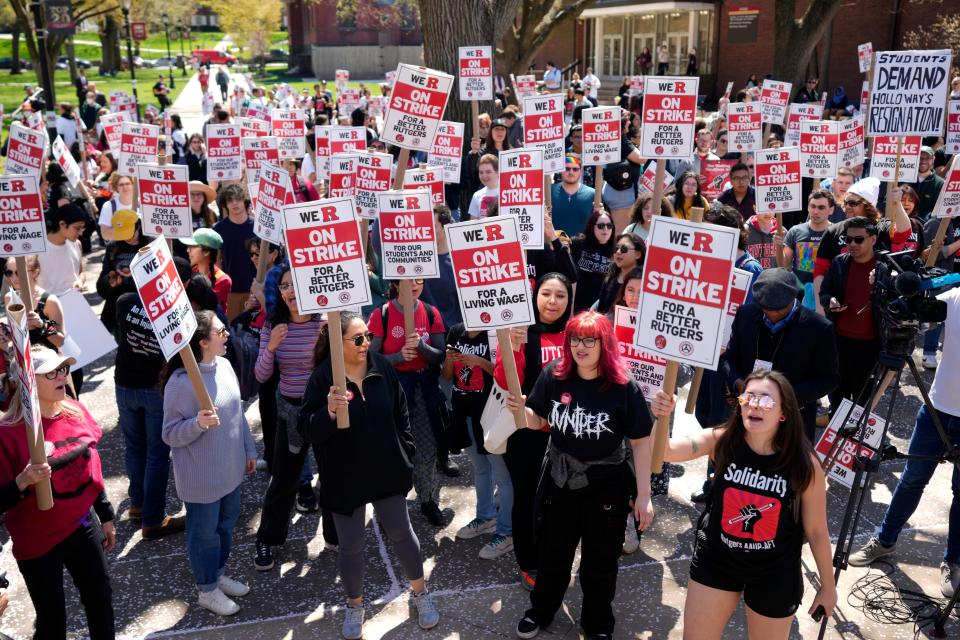Rutgers University faculty strike continues for fourth day as talks progress
- Oops!Something went wrong.Please try again later.
Educators, clinicians, librarians and researchers continued their walkout Thursday as an unprecedented strike by three Rutgers University unions representing 9,000 faculty members entered its fourth day on all three campuses.
Union leaders speaking from Gov. Phil Murphy's offices in Trenton on Wednesday at an 8 p.m. daily public Zoom meeting livestreamed on YouTube were not jubilant — but they said there had been some progress on economic demands relating to pay raises and the pattern of those raises, and that intense negotiations with the university, and with the help of state mediators, was continuing.
Non-economic demands remain to be addressed, they said. These include extending parental leave for graduate student workers and professors from eight weeks to 12 weeks, rent freezes on campus student housing, and forgiveness of some outstanding fines and fees for students.
Premature to predict deal
Discussions were still too premature to announce the likelihood of a deal, union leaders said.
"You're not going to be satisfied with the update tonight, but we are working as hard as possible," Adjunct Faculty Union President Amy Higer, a political science lecturer at the university's Division of Global Affairs, told the hundreds of union members attending virtually. It was clear that negotiations had not advanced far enough for the strike to be called off.

Wednesday was spent resolving economic proposals, said Dr. Catherine Monteleone, a doctor at Robert Wood Johnson University Hospital in New Brunswick. "We had a meeting with the interested parties, and it was difficult," Monteleone said.
Monteleone said support from "all units" was making a difference to the unions' core demands and to the workers she represents at Rutgers Biomedical and Health Sciences. Union leaders said they were very tired but were energized by the organizing and picketing on the campuses.
The three striking unions have the support of a coalition of 19 Rutgers unions representing 20,000 workers, according to the Rutgers AAUP-AFT website. At least nine other unions representing 6,000 workers do not have a contract yet or are negotiating for one, said Alan Maass, communications representative for the AAUP-AFT.
Students join faculty picket lines
Picketing at three campuses continued Thursday, and there was a very high turnout by students supporting the strike on College Avenue in New Brunswick, said Donna Murch, an associate professor of history and president of the New Brunswick chapter of Rutgers AAUP-AFT.
The scale of undergraduate participation in the strike has been "amazing," Murch said. "I've never seen anything like it, apart from the Black Lives Matter movement. This may be the most profound thing I have experienced at Rutgers."
Day three: Striking Rutgers unions 'guardedly optimistic' about reaching deal as Murphy steps in
Stile: The Rutgers strike has Phil Murphy 'pissed off.' This is the squeeze he's in | Stile
One union member who spoke at the public livestream expressed concern about the delay in a contract and questioned how useful it was for discussions to continue in Trenton if they were not closer to a deal. Gov. Phil Murphy moved discussions to Trenton after the strike was announced Sunday night. For the previous 10 months they were held at Rutgers.
Murphy is pushing the university and unions to find a solution as soon as possible, and he has indicated that he wants a contract that supports core demands addressing the university's part-time and lowest-paid academic workers.
One attendee at the meeting asked Murphy to prove his commitment as a labor-friendly governor by showing up at the campuses' picket lines where students and faculty are marching and chanting.
Some other union members responded, saying the questions raised at the Wednesday meeting were not representative of union-wide sentiment, and that it was more important to send Trenton and Rutgers negotiators a message by showing up in large numbers to picket.
Politicians weigh in from both sides
Elected officials and political players continue to chime in with comments about the impasse between union members and the Rutgers administration.
"Do better, Rutgers," said Ras Baraka, the mayor of Newark and a Democrat. "If we stand for anything in New Jersey, it should be equal pay. In addition, the teaching and graduate assistants need adequate pay raises so that they can do their work, finish their scholarship for their Ph.D.s, be able to pay rent and their student loans. They earn less than $32,000 a year. This is a university that has paid more than $1 million to an assistant coach."
Meanwhile, Jack Ciattarelli, a former state assemblyman and the 2021 Republican challenger to Murphy, mocked progressive Vermont Sen. Bernie Sanders' support for the unions while sympathizing with Rutgers students who start final exams in two weeks. "Notice how Bernie Sanders never mentions students, especially the seniors who are a few weeks away from graduation?" Ciattarelli tweeted.
Adjunct and graduate student worker demands
"I do think the whole union is united around the importance of adjunct demands, graduate worker demands and common-good demands and having a transformative contract," Murch said. "Right now there is intense and extremely important bargaining going on."
Those core demands address increased wages and job security for adjunct professors, who currently have to renew their contracts every semester, irrespective of how long they have worked for the university.
The unions also want higher salaries for graduate student workers, from $30,000 annually to $37,000.
These demands are equity-driven for the lowest-paid faculty, say union members, and entail systemic changes to how the university approaches hiring them.
The demand for longer contracts for adjunct faculty has a national significance for American higher education institutions, union members say, because this could signal changes in a hiring trend that has focused on cheaper and contingent labor over higher-paid full-time and tenured faculty.
This article originally appeared on NorthJersey.com: Rutgers strike update 2023: Contract talks progress on fourth day

